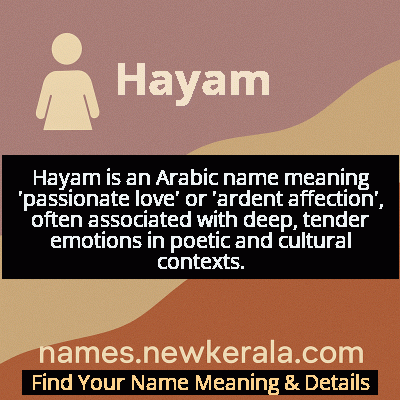Hayam Name Meaning & Details
Origin, Popularity, Numerology Analysis & Name Meaning of Hayam
Discover the origin, meaning, and cultural significance of the name HAYAM. Delve into its historical roots and explore the lasting impact it has had on communities and traditions.
Name
Hayam
Gender
Female
Origin
Muslim
Lucky Number
3
Meaning of the Name - Hayam
Hayam is an Arabic name meaning 'passionate love' or 'ardent affection', often associated with deep, tender emotions in poetic and cultural contexts.
Hayam - Complete Numerology Analysis
Your Numerology Number
Based on Pythagorean Numerology System
Ruling Planet
Jupiter
Positive Nature
Optimistic, inspirational, and creative.
Negative Traits
Scattered, exaggerating.
Lucky Colours
Yellow, gold, purple.
Lucky Days
Thursday.
Lucky Stones
Yellow sapphire.
Harmony Numbers
1, 2, 9.
Best Suited Professions
Arts, writing, communication.
What People Like About You
Creativity, optimism.
Famous People Named Hayam
Hayam Abbas
Egyptian actress
Celebrated for roles in Egyptian television dramas portraying strong female characters
Hayam Al-Saeed
Saudi educator
Pioneer in women's education in Saudi Arabia, founder of educational institutions for girls
Hayam Farouk
Emirati poet
Award-winning poet known for modern Arabic poetry exploring love and identity themes
Hayam Younes
Jordanian businesswoman
Successful entrepreneur in Middle Eastern fashion industry, luxury brand founder
Name Variations & International Equivalents
Click on blue names to explore their detailed meanings. Gray names with will be available soon.
Cultural & Historical Significance
In various Muslim communities, Hayam has been used across generations, maintaining its appeal due to its beautiful meaning and elegant pronunciation. The name carries associations with traditional values of family, commitment, and emotional sincerity. During the Islamic Golden Age, names with poetic and emotional meanings gained popularity among educated classes, and Hayam exemplifies this tradition. In contemporary Muslim societies, the name continues to be chosen by parents who value both cultural heritage and the expression of positive emotional qualities, serving as a bridge between traditional values and modern sensibilities about emotional expression and personal identity.
Extended Personality Analysis
Women named Hayam are typically characterized by their remarkable emotional intensity and capacity for deep connection. Their passionate nature manifests in all aspects of life, from personal relationships to professional pursuits. They approach love and friendship with extraordinary commitment, often forming bonds that last lifetimes. Hayams possess a natural warmth and empathy that makes others feel understood and valued. They are often described as having 'old souls'—wise beyond their years in matters of the heart. Their emotional intelligence allows them to navigate complex social situations with grace and understanding.
In terms of character strengths, Hayams demonstrate exceptional loyalty and reliability. Once they commit to a person or cause, they remain steadfast through challenges. Their passionate nature drives them to pursue their goals with determination and enthusiasm. While they feel emotions deeply, they typically develop strong coping mechanisms that allow them to maintain emotional balance. Creative expression often serves as an outlet for their intense feelings, and many Hayams excel in artistic fields. They bring energy and sincerity to every interaction, making them memorable individuals who leave lasting impressions on everyone they meet. Their combination of emotional depth and practical resilience makes them both inspiring and dependable presence in their communities.
Modern Usage & Popularity
In contemporary naming practices, Hayam maintains a distinctive presence as a meaningful choice that balances tradition with modern appeal. While not among the most common Muslim names, it enjoys consistent usage across generations, particularly in Arab countries like Egypt, Saudi Arabia, Jordan, and the UAE. The name has experienced a modest revival in recent years as part of a broader trend toward rediscovering classical Arabic names with beautiful meanings. Among diaspora communities in Europe and North America, Hayam is increasingly chosen by parents seeking names that preserve cultural identity while being phonetically accessible to non-Arabic speakers. Social media platforms have contributed to the name's visibility, with several influencers and professionals named Hayam building significant followings. The name's elegant simplicity and profound meaning make it particularly appealing to educated, cosmopolitan parents who value both cultural heritage and emotional depth. Current naming data shows steady but selective usage, with Hayam often chosen by parents who specifically seek names conveying positive emotional qualities and spiritual significance.
Symbolic & Spiritual Meanings
Symbolically, Hayam represents the highest expression of emotional experience and spiritual connection. The name embodies love as a transformative, all-encompassing force that elevates human existence beyond ordinary experience. In Islamic symbolism, this intense love reflects the soul's yearning for divine union and the concept of 'ishq'—sacred love that transcends worldly attachment. The name also symbolizes emotional authenticity and depth of feeling, representing individuals who experience life with remarkable intensity and sincerity. In broader philosophical terms, Hayam symbolizes the courage to love deeply despite vulnerability, and the wisdom to understand love as both personal emotion and universal principle. The name carries connotations of nurturing energy and emotional generosity, symbolizing the life-giving power of genuine affection. It serves as a reminder of love's capacity to bridge differences, heal wounds, and create meaningful connections that transcend superficial interactions. In many cultural contexts, the name Hayam has come to represent the ideal of emotional integrity—the alignment of inner feeling with outward expression, and the commitment to relationships based on genuine connection rather than convenience or social expectation.

